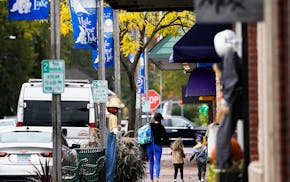All John Abraham wants is a civil discussion about global warming.
That's why on Tuesday morning he was sharing the airwaves with Jake Judd, a talk-show host on 1340 KDLM, Real Country News in Detroit Lakes, Minn., and self-professed skeptic on climate change.
By the end of the half-hour radio chat, civility won out. More important for Abraham, consensus across the vast divide between a skeptic and a climate scientist had been reached.
"All right, all right," Judd said. "No matter what side you are on, most people agree that Earth is warming and we have to do something about it."
Abraham, an associate professor at the University of St. Thomas, is part of a national movement among climate scientists and researchers who are stepping out of the ivory tower and into the harsh light of politics and the public debate around global warming. They say they are making an organized effort to take their certainty about the risk to the planet to the public -- before it's too late.
"We need to depolarize the debate," Abraham said. "As long as we are polarized, we are stalemated."
This week Abraham launched a "ready response team" website to quickly connect the news media to about 50 national experts on everything from polar bears to flooding in Pakistan to the influence of sun spots on the Earth's temperature.
At the same time, the American Geophysical Union, an international organization of geophysical researchers, established a similar bank of climate scientists to serve as experts on global warming. Late last week a group of influential scientists published a letter in the magazine Science calling for an independent public education initiative to effectively share information about climate change.
The scientists say they are not advocates or partisan. They are taking the unusual step -- for scientists -- of engaging in the discussion because the urgency is growing and misinformation is clouding the increasingly important public debate.
Some say it's about time.
"We need more academics engaged in the public debate," said Andy Hoffman, a professor with the Erb Institute at the University of Michigan who studies the social aspects of climate change. "Because they have remained largely on the sidelines, they have ceded the space to extreme views and leave the public confused."
Abraham, who looks as young as the students he teaches and "walks the walk," he said, by driving a hybrid car, already has been singed by some of those extremists.
Monckton vs. Abraham
In October 2009 an internationally known climate change skeptic, Lord Christopher Monckton, gave a talk at Bethel University in Arden Hills that shocked Abraham into action.
He spent months painstakingly crafting a point-by-point, fact-based rebuttal to Monckton's claims, then posted it on the faculty website. A blogger picked it up, then the British newspaper the Guardian published a story that inflamed cyberspace and unexpectedly put the small college's engineering department smack in the middle of a global Internet war.
On news sites and blogs around he world, Abraham was either praised as a long-needed voice of reason or vilified for attacking Monckton, a British journalist, classics scholar and politician also known as 3rd Viscount Monckton of Brenchley, who had testified before Congress.
Monckton's response was anything but scientific. In a YouTube clip, he called Abraham "a wretched little man," the University of St. Thomas "a half-assed Catholic Bible college," and its president, the Rev. Dennis Dease, "a creep."
He also described the shaved-headed Abraham as an "overcooked prawn," spawning a Facebook page created in Abraham's defense called "prawngate."
"I don't think I look like a prawn," Abraham said earlier this month as he related the story to an amused high school class at the School of Environmental Studies in Apple Valley.
The level of hate he encountered was stunning, Abraham said, but he understands why.
"People are enamored of unlimited free will and free markets," he said. "If they accept the science, then they have to accept change."
But he also learned that there were many other scientists who felt as he did. They were at last willing to engage with the public about the scientific consensus that our rapid consumption of carbon is causing the world to heat up faster than is good for the human species.
"People who are complete nonexperts go around telling a bunch of lies," said Barry Bickmore, a professor of geological science at Brigham Young University in Utah, who describes himself as a staunch conservative Republican and a Mormon. "I came to the conclusion that we can't sit back and expect the truth to prevail in the end." He is among the scientists who have signed on to Abraham's ready response team.
Hoffman, of the University of Michigan, said that public understanding and acceptance of the science behind climate change is following a similar course as with cigarettes. First came scientific consensus on the connection between smoking and cancer. Only after many years came the social consensus, he said.
"The first is a technical process, the second is a social and political process," he said. That's where the climate change debate is today. Still, he warns that if scientists like Abraham are perceived as advocates, they run the risk of undermining their message.
"They must stick to presenting their data and their results dispassionately," he said.
Focusing on the facts
It helps his cause that Abraham, an expert on heat transfer, is both dispassionate and clear in explaining the complex science. Since the Monckton affair launched him into the limelight, he's been doing a lot more of it.
"Humans have caused a 30 percent increase in carbon dioxide," he explained to the Apple Valley students at a guest lecture last week. He illustrated the science with PowerPoint slides that showed the relationship between the sun and the Earth's atmosphere, and how scientists track centuries-old temperature data with tree rings and ice cores.
He's equally dispassionate with those who challenge the science, including Judd, the talk show host from Detroit Lakes, who invited him on the show because Abraham "wanted to take on the skeptics head on."
"Don't you think that as a species, we would adjust" to climate change, Judd asked.
"How would a country absorb 30 or 40 million climate refugees," Abraham countered.
But the world is not ending, Abraham added. There are solutions, he said -- if only we could get to that conversation.
"We need to move beyond the question of 'Is it happening?' to 'What are we going to do about it?'" he said.
Josephine Marcotty • 612-673-7394

Shop the curbs for free on 'Trash to Treasure Day' in White Bear Lake

Lacrosse 2024: Boys or girls, discussion begins in the same place

Will 'shotgun only' zone for deer in southern Minnesota be abolished?
One killed in head-on crash in Coon Rapids
